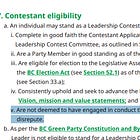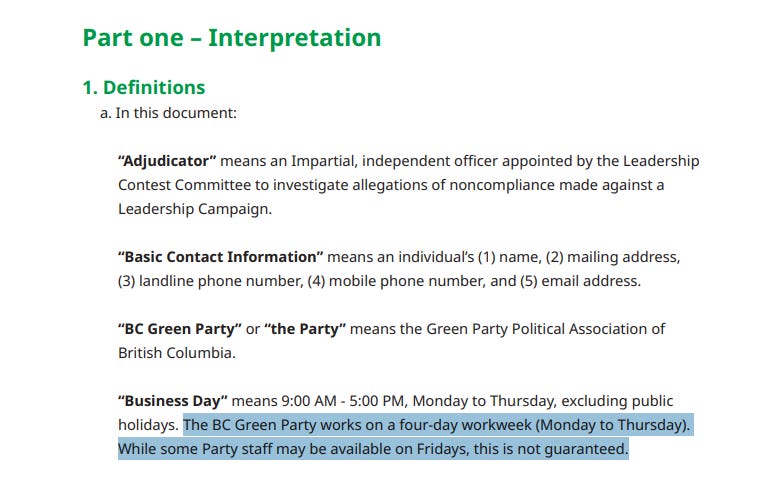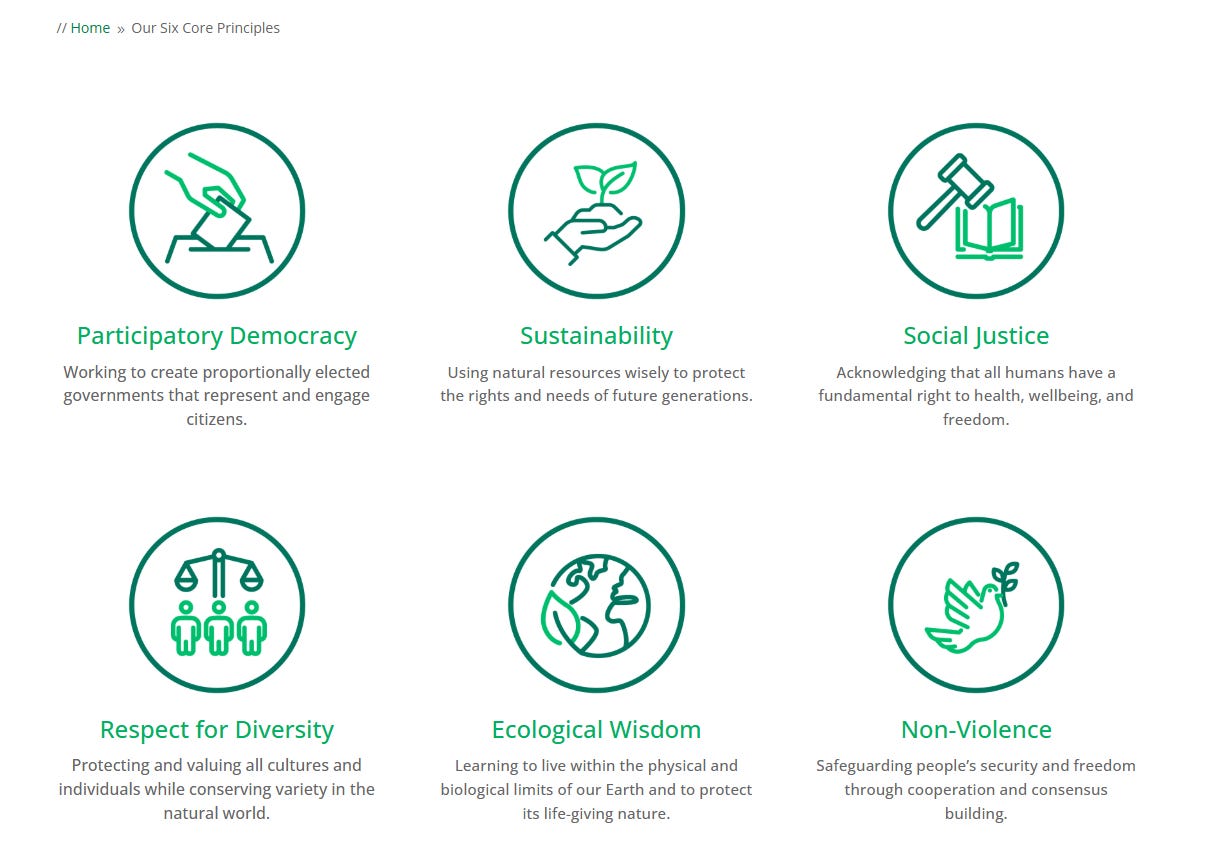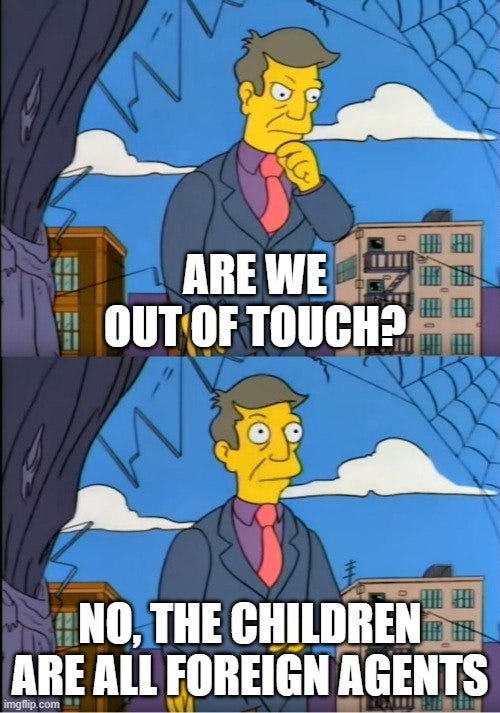Next Wednesday the BC Green Party will announce their new leader. The party has been in the midst of a leadership race following half the party’s vote share evaporating in the last election. Voting opened on Saturday.
The party has focused a lot of their energy not on finding a new leader, but on preventing people from becoming members. The reason is, ostensibly, the threat of foreign interference.
“While the BC Green Party is not bound by law to verify members’ status, even the suspicion of foreign interference could jeopardize the legitimacy of the leadership contest, and by extension, the legitimacy of the party’s new leader themselves.”
Alex Pope, Chair, Green Party Leadership Contest Committee
To support their onerous process to prevent foreign interference, the party points to an interview on Global with a professor at Ontario Tech University who recommended that political parties implement identification checks for membership. He also said that youth should be barred from voting in leadership contests.
Invaders at the gates?
In January of this year, the Public Inquiry into Foreign Interference in Federal Electoral Processes and Democratic Institutions (PIFIFEPDI) submitted its final report to the House of Commons. The Commission was called in response to reports from the Canadian Security Intelligence Service (CSIS) that warned that “hostile states and state-sponsored actors are targeting Canada’s democratic institutions and processes.”
“While Canada’s electoral system is strong, threat actors have sought to target its politicians, political parties, elections, and its media outlets in order to manipulate the Canadian public and interfere with Canada’s democracy.”
Foreign interference is defined in the final report as, “a clandestine, deceptive or threatening activity by a foreign state, or those acting on a state’s behalf, that is detrimental to the interests of Canada.” It is noted that there are legitimate, diplomatic interactions with foreign states that constitute “influence”, which is not illegal. “Diplomacy, even aggressive attempts to influence other countries, is legitimate when it is done in the open and does not involve threats to individuals or groups.”
In all the reports related to foreign interference, there is a consensus that this is nothing new — only that the methods are evolving alongside technology. The primary method of foreign interference identified in the report is disinformation which, while prevalent, was determined to have not significantly impacted the 2019 or 2021 elections.
“Though the [Media Ecosystem Observatory] found a large amount of misinformation circulating in the media ecosystem, particularly with regards to COVID-19 measures and claims of widespread voter fraud, it concluded that the misinformation had a limited impact on the election, due to the fact that it prompted little discussion and Canadians were able to detect false stories.”
Public Inquiry Into Foreign Interference in Federal Electoral Processes and Democratic Institutions. Final Report. Volume 2: Context and Commission’s Mandate / The 2019 and 2021 General Elections (Facts and Analysis), Page 130.
In fact, the Commission found that Canada’s democratic systems are stable, robust and accountable. Foreign governments certainly try to interfere in Canadian politics, but they are largely unsuccessful.
“Although there are a very small number of isolated cases where foreign interference may have had some impact on the outcome of a nomination contest or the result of an election in a given riding, there is no evidence to suggest that our institutions have been seriously affected by such interference or that parliamentarians owe their successful election to foreign entities. While any attempted interference is troubling, I am reassured by the minimal impact such efforts have had to date.”
Public Inquiry Into Foreign Interference in Federal Electoral Processes and Democratic Institutions. Final Report. Volume 1: Report Summary, Page 3.
The report is almost entirely recommendations for how the federal government can take actions to safeguard against foreign interference. It is only in Chapter 13 — 64 pages into the report — that political parties are explored as a potential vulnerability point. The report mentions that parliamentarians and intelligence agencies expressed concerns about internal political party processes, but also highlighted that parties have tools and methods at their disposal to mitigate these risks.
“Although the Security and Intelligence Threats to Elections Task Force (SITE TF) suggests that nomination contests could be used by foreign states to influence who could become an MP, the evidence did not indicate that this has been widespread to date. In fact, the evidence disclosed only one such potential case: the 2019 nomination contest in Don Valley North, which was mentioned in the government’s list of six major instances of suspected foreign interference.”
Public Inquiry Into Foreign Interference in Federal Electoral Processes and Democratic Institutions. Final Report. Volume 1: Report Summary, Page 65.
The report makes a number of recommendations regarding political parties, including developing a national best practices guide for nomination contests, political party leaders receiving security clearance, reinstating public funding for political organizations, and limiting voting rights to Canadian citizens and permanent residents — something most political parties do already.
“Political parties are private entities and, in our democracy, they have considerable autonomy over their decision-making processes. For this reason, I do not recommend imposing further rules about who should be entitled to vote.”
Public Inquiry Into Foreign Interference in Federal Electoral Processes and Democratic Institutions. Final Report. Volume 5: Recommendations to Better Protect Against Foreign Interference in Canada’s Democratic Institutions and Processes, Page 33.
Disenfranchisement
Consistent with the recommendations of the Commission, the BC Greens already require members to be Canadian citizens or permanent residents. Members are then allowed to vote as long as they have been members for more than 60 days, are 14 or older, and have paid their annual fee — all reasonable steps in line with the Commission’s report. The party’s constitution and bylaws, which outline these requirements, supersede any of the leadership contest rules.
While the leadership contest rules do mention foreign interference, they only state that leadership campaigns must take reasonable steps to protect their campaign from foreign interference, attend any mandatory workshops required by the party, and avoid creating and distributing misinformation.
One of the primary goals in running a robust leadership race is the potential to sign up and engage new members. The 2011 BC Liberal leadership race brought in 50,000 new members. The BC NDP leadership in 2022, despite being an acclamation, brought in 16,000 new members. According to the BC Green Party, a modest 4,500 people signed up to be new members. The vast majority of these members paid dues (youth members are exempt), so that means tens of thousands of dollars into the party’s coffers.
How did the BC Green Party welcome these new members? By blocking the majority of them from voting.
The party has implemented stringent verification rules for new members to vote in the upcoming contest. Every new member must upload a copy of their identification to a third-party vendor in Ontario, schedule a virtual meeting with party staff to review their ID, or have a family member or existing party member fill out a form vouching for them — otherwise they will be denied a ballot.
The party does not require any additional verification of existing or renewing members, even though the report on foreign interference lists “long-term cultivation of long-lasting relationships with their target” as its very first example of foreign interference tactics.
None of these options for verification are quick. Because the requirement to verify was not communicated to new members when they signed up, they need to watch for an email from the party explaining that they are unverified. A new member then needs to fill out a form to receive an email from the third party vendor taking them to a website where they can upload their documents, which will be scanned by a computer algorithm. The whole process can take around 48 hours. Scheduling an appointment with staff depends on availability, and the party office is closed Fridays, Saturdays and Sundays.
None of this process, nor the extraordinary powers party administrators have granted themselves to block members in good standing from voting, are found in the leadership contest rules, the party bylaws, or party constitution.
Who cares about rules anyways?
Technically, if you’re following the actual rules, anyone who was a member of the party in good standing as of August 10th is eligible to vote in the leadership race. Party officials do not have the power to unilaterally bar members in good standing from voting.
Two weeks before voting opened, the party estimated that only 20% of their new members had completed the onerous verification process. By the end of last week, party officials told reporters the number was closer to 40%, but also claimed only 3,700 people signed up — not 4,500 as reported earlier. That means somewhere between 2,220 and 3,000 members will be denied ballots, depending on which number is accurate. The party supposedly “spent months preparing for this part of the leadership contest.” In any other field, a system that fails to process 60-80% of new sign-ups would be deemed a failure and thrown out.
“We have created the best process we can out of a very small field of options.”
Stefan Jonsson, Green Party Executive Advisor
It is possible the party does not consider it important to follow its own bylaws and constitution, and will simply deny these people their right to vote, then keep them as members with their personal information on file to contact during the next election. The party will likely keep their membership dues, too.
Two of the party’s leadership candidates have enthusiastically supported the possible disenfranchisement of a quarter of their entire membership. Jonathan Kerr said, “there are enough ways to verify that every member who is sufficiently motivated to vote will be able to do so,” and Adam Bremner-Akins praised the requirements as “fair, balanced and required to mitigate against outside forces in the race.” Only Emily Lowan, whose campaign focused on growing the party, has challenged the fairness of the process.
“This is an effort to demonstrate how seriously we are taking the concerns of members who are feeling disenfranchised by the verification process. I know many who are reporting this feeling of distrust with the party.”
Emily Lowan, Green Party leadership candidate
One thing missing from any of the party’s explanations of why they must disenfranchise thousands of members is whether any actual foreign interference is believed to be taking place.
Maybe it’s decisions like this that explain why 92% of British Columbians rejected the Green Party in the last provincial election.












I am sure the party will be open and transparent about all the foreign infiltrators they discover. The same way someone at the same head office that is ahem trying to verify voters (who could and should have been verified on sign-up) openly and transparently leaked the letter from the lawyer challenging the legality of their approach. Thanks for doing the heavy lifting on this. Anyone want to take bets on whether the BC Greens find a single foreign infiltrator?
Sounds like someone at the Green Party doesn't want Emily as the new leader and got scared when she sold more memberships. Like you say, definitely not building any trust with the membership.